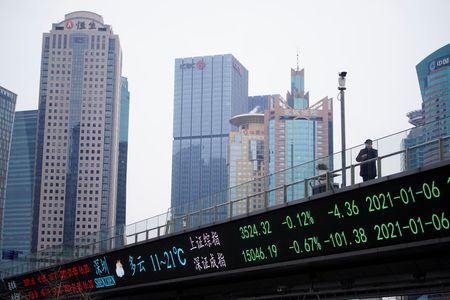 1
1 1
1
By Jamie McGeever
(Reuters) – A look at the day ahead in Asian markets from Jamie McGeever.
A barrage of Chinese economic data on Tuesday will give investors a clearer picture of whether their growing fears over the health of Asia’s largest economy lately are justified.
If the April snapshots of retail sales, urban investment and industrial production come in weaker than expected – and consensus forecasts are for solid rebounds from the month before – the China bears and doomsters will be in the ascendancy.
Broader market sentiment may be reasonably well supported after Wall Street eked out modest gains on Monday despite alarming slump in a key index of U.S. factory activity and another day of deadlock in the U.S. debt ceiling negotiations.
On the Chinese data, the forecasts from Reuters polls of economists are for: retail sales to rise 21% year on year, double the pace from March; urban investment to rise 5.5%; and industrial production to rise 10.9% year on year, more than twice as fast as March.
China’s growth momentum has slowed sharply, reflected most dramatically in the collapse in imports and inflation, and Citi’s Chinese economic surprise index on Monday fell below 100.0 for the first time since March 9.
But Chinese stocks snapped their recent losing streak on Monday – the blue chips index rose 1.5% for its best day since Feb. 20, and second best day this year – as investors turn their attention to three key earnings reports this week.
Tech giants Baidu and Tencent report Q1 results on Tuesday and Wednesday, respectively, and Alibaba releases full-year 2023 results on Thursday.
The Hang Seng tech index has significantly underperformed the Nasdaq this year – it is down 5% while Wall Street’s major tech index is up 18% – but it has rallied for the last four sessions, its best run since March.
Elsewhere in Asia, the Thai baht on Monday posted its biggest rise against the dollar in three weeks, lifted by stronger-than-expected GDP growth figures, although investors were braced for political uncertainty after the opposition secured a stunning election victory on Sunday.
Meanwhile, convention around blackout periods ahead of policy decisions are a little different in the Philippines from the United States, as shown by remarks made by the central bank governor on Monday just three days before the next meeting.
Bangko Sentral ng Pilipinas (BSP) Governor Felipe Medalla told reporters that the central bank could pause its interest rate hikes this week, after inflation in April eased again.
The Philippine peso on Monday slipped to its lowest against the dollar in almost a month.
Here are three key developments that could provide more direction to markets on Tuesday:
– Australia consumer sentiment (May)
– China investment, retail sales, industrial output (April)
– Euro zone GDP (Q1, flash estimate)
(By Jamie McGeever; Editing by Lisa Shumaker)